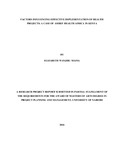| dc.description.abstract | The purpose of this study was to determine the factors that influence effective implementation of health projects with a key focus on AMREF Health Africa in Kenya. The study was guided by the following research questions -how does stakeholder’s engagement influence implementation of health projects at AMREF Health Africa in Kenya? , how does donor funding influence the implementation of health projects at AMREF Health Africa in Kenya? , how does organizational structure influence implementation of health projects at AMREF Health Africa in Kenya?, how does utilization of strategy influence implementation of health projects at AMREF Health Africa in Kenya? A descriptive survey research design was adopted, with AMREF Health Africa in Kenya being the focus organization. The population for the study comprise of employees working at AMREF Health Africa in Kenya (those implementing projects) since this is the organization under study. The study target population comprised a total of 300 employees who were at the frontline in the implementation of various projects. Stratified random sampling technique was be used to draw a sample size of 70 respondents. The data collection instrument was a tailor-made structured questionnaire developed by the researcher, specifically for this study. A set of descriptive statistics of frequency and mean tables were used to present the results of the study. Computation and data processing was done using Statistical Package for Social Scientists (SPSS) version 20. The study found that donor funding was critical in ensuring effectiveness in implementing health projects. The study noted that the most influential factor in creating donor confidence in funding was the financial accountability, as good financial propriety demonstrated commitment to standards and work ethics. The study also established that project use of strategy was vital in ensuring seamless project execution. The main determinant was formulation and it was noted that, best practise in developing use of strategy was to undertake it at the project planning phase. The study established that organisation structure was critical in project implementation as it informed the personnel distribution on different units of project implementation team. The study finally established that for effective project implementation it was vital to ensure stakeholders engagement throughout the course of the project. | en_US |

